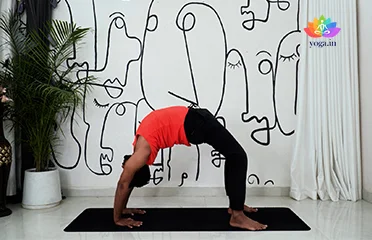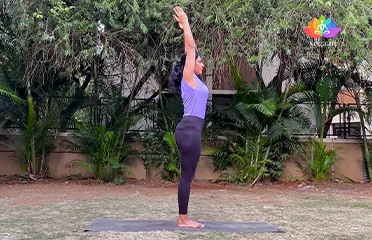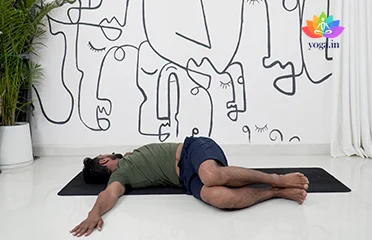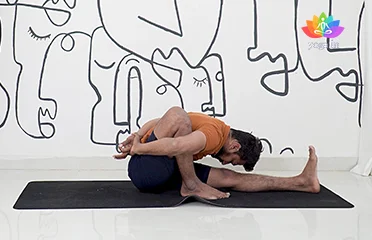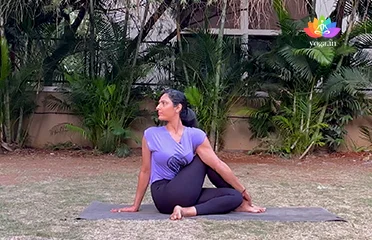Akarna Dhanurasana (Archer Pose)
अकर्णा धनुरासन / Archer Pose
The Sanskrit name is derived from Akarna (अकर्णा ) meaning towards [�K]
Ardha Chandrasana (Half Moon Pose)
अर्धचन्द्रासना / Half Moon Pose
The Sanskrit name is derived from Ardha (अर्ध) meaning half, Chandra [�K]
Bhujangasana (Cobra Pose)
भुजंगासन / Cobra Pose
The Sanskrit name is derived from Bhujanga (भुजंगा) meaning cobra [�K]
Chakrasana (Wheel Pose)
चक्रासनI / Wheel Pose
The Sanskrit name is derived from Chakra (चक्रा) means wheel and asana [�K]
Hastapadasana (Hand to Foot Pose)
हस्तपदासन / Hand to Foot Pose
The sanskrit name is derived from hasta (हस्त) means hands, pada (पदा) [�K]
Jathara Parivartanasana (The Abdominal T
ञठर परिवर्तनासन / The Abdominal Twist
The Sanskrit name is derived from Jathara (ञठर) meaning belly or abdomen, [�K]
Kurmasana (Tortoise Pose)
कूर्मासन / Tortoise Pose
The Sanskrit name is derived from Kurma (कूर्मा) meaning tortoise [�K]
Marichyasana (Sage Twist Pose)
मरीच्यासन / Sage Twist Pose
The Sanskrit name is derived from Marichya (मरीच्) meaning ray of [�K]
Matsyendrasana (Lord of the Fishes Pose)
मत्स्येन्द्रासन / Lord of the Fishes Pose
The name Matsyendrasana is derived from the Sanskrit words Matsya (मत्स्य) [�K]
Naukasana (Boat Pose)
नौकासन / Boat Pose
The Sanskrit name is derived from Nava ( नाव) meaning boat and asana (आसन) [�K]
- 1
- 2
- 3
How Yoga Can Help Cure Dysentery:
Dysentery is a gastrointestinal infection that causes inflammation of the intestines, leading to severe diarrhea with blood and mucus. Yoga can aid in the treatment and relief of dysentery by promoting digestive health, reducing inflammation, and strengthening the immune system. Specific yoga practices can help alleviate symptoms, improve digestion, and promote overall well-being.
Understanding Dysentery:
Dysentery is a gastrointestinal infection characterized by inflammation of the intestines, often caused by bacteria, parasites, or viruses. It results in severe diarrhea, abdominal pain, cramping, and sometimes fever. Dysentery can be acute or chronic and is usually spread through contaminated food or water.
Yoga’s Role in Relieving Dysentery:
Yoga offers various practices that can help relieve the symptoms of dysentery and promote healing. Gentle yoga poses, breathing exercises, and meditation techniques can soothe the digestive system, reduce inflammation, and boost the body’s immune response. These practices also aid in stress management, which is essential for overall well-being during recovery.
Key Factors Contributing to Dysentery:
Several factors can contribute to the development of dysentery, including:
- Contaminated food and water
- Poor sanitation and hygiene practices
- Bacterial, parasitic, or viral infections
- Weakened immune system
Symptoms of Dysentery:
Common symptoms of dysentery include:
- Severe diarrhea with blood and mucus
- Abdominal pain and cramping
- Fever
- Nausea and vomiting
- Dehydration
- Fatigue
Treatment of Dysentery through Yoga and Pranayama:
Yoga and pranayama can complement medical treatment for dysentery by promoting recovery and strengthening the body. Some beneficial practices include:
Specific Yoga Poses:
- Apanasana (Knee-to-Chest Pose): Relieves gas and bloating, improves digestion.
- Balasana (Child’s Pose): Calms the mind and gently stretches the abdomen.
- Supta Matsyendrasana (Supine Spinal Twist): Improves digestion and relieves abdominal discomfort.
Pranayama Exercises:
- Deep Belly Breathing: Calms the nervous system and promotes relaxation.
- Bhastrika Pranayama (Bellows Breath): Increases oxygen flow, boosts immunity.
Diet for Dysentery:
A bland and easily digestible diet is recommended during dysentery recovery. Suggestions include:
- Clear fluids like broth, electrolyte-rich drinks, and coconut water to prevent dehydration.
- Plain, easily digestible foods like rice, bananas, boiled potatoes, and toast.
- Avoid spicy, fatty, or dairy-rich foods that can irritate the digestive system.
Caution for Dysentery:
While practicing yoga for dysentery recovery, it’s essential to:
- Listen to your body and avoid strenuous poses that may worsen symptoms.
- Stay hydrated and take breaks as needed during practice.
- Consult with a healthcare provider if symptoms persist or worsen.
Contraindications for Dysentery:
Individuals with severe dysentery or those experiencing dehydration should:
- Avoid intense physical activity, including vigorous yoga practices.
- Refrain from poses that put pressure on the abdomen or aggravate symptoms.
- Seek medical attention promptly if symptoms are severe or persistent.





